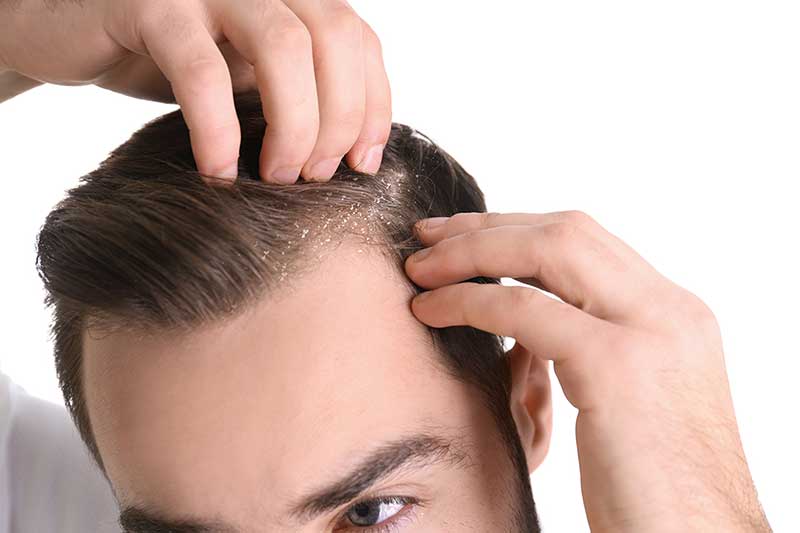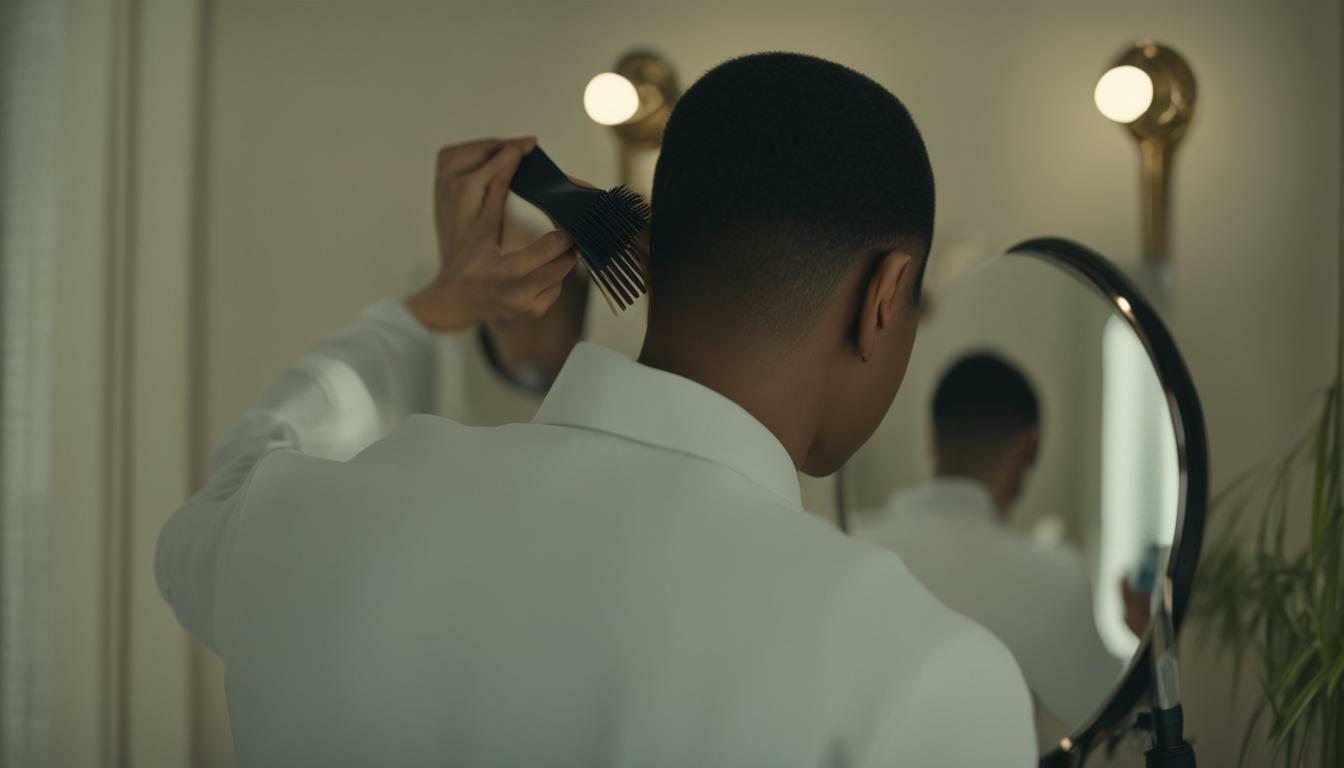Dandruff around the hairline can be a frustrating issue that affects many people. Not only is it unsightly, but it can also be itchy and uncomfortable. Fortunately, with the right tips and treatments, you can maintain a healthy scalp and banish dandruff for good.
In this section, we will explore the causes of scalp dandruff, provide effective tips for preventing and managing dandruff, and offer targeted solutions for addressing dandruff around the hairline.
Key Takeaways:
- Dandruff around the hairline is a common issue that affects many people.
- Understanding the causes of dandruff, such as dry scalp and fungal infections, can help you prevent and manage flakes.
- Proper scalp care, including the use of the right shampoo and conditioner, is essential for maintaining a healthy scalp and preventing dandruff.
- Treatments for dandruff, such as medicated shampoos and natural remedies like tea tree oil, can effectively combat scalp flakes.
- Targeted solutions for dandruff around the hairline, such as gentle exfoliation and specialized products, can help you maintain a dandruff-free hairline.
Understanding Dandruff Causes and Symptoms
If you’re dealing with dandruff, it’s important to understand the underlying causes and symptoms to effectively treat and prevent it. Dandruff is often the result of an overgrowth of yeast on the scalp, which leads to inflammation and flaking. Here are some of the common factors that contribute to dandruff:
- Dry scalp: A lack of moisture on the scalp can cause skin to flake and become itchy.
- Excessive oil production: On the other hand, an overly oily scalp can also lead to dandruff, as the excess oil can trap dead skin cells and cause them to clump together.
- Fungal infections: Dandruff can also be caused by fungal infections, such as seborrheic dermatitis, which affects areas of the body with a high concentration of oil glands.
Regardless of the cause, dandruff is often accompanied by symptoms such as itchiness, flaking, and a dry or greasy scalp. If you’re experiencing any of these symptoms, it’s important to take action to address the underlying issue and prevent further dandruff formation.
Hair Care Tips for Managing Dandruff
In addition to treating any underlying causes of dandruff, there are also several hair care tips that can help manage and prevent flakes. Here are some things to keep in mind when caring for your scalp:
- Use a dandruff shampoo: Look for a shampoo specifically formulated to treat dandruff, and use it at least twice a week to keep flakes at bay.
- Avoid harsh hair products: Certain hair products, such as hairspray and styling gel, can irritate the scalp and contribute to dandruff formation. Opt for gentle, natural products instead.
- Don’t over-wash your hair: While it’s important to keep your scalp clean, over-washing can strip your scalp of its natural oils and lead to dryness and flaking.
- Brush your hair regularly: Brushing your hair regularly helps distribute natural oils throughout your scalp, preventing dryness and flakes.
By following these simple hair care tips, you can help keep your scalp healthy and free from dandruff. However, if you’re struggling with persistent flakes, it may be worth consulting with a dermatologist to determine the underlying cause and receive targeted treatment.
Tips for Preventing and Managing Dandruff
Dandruff can be a persistent problem, but there are several steps you can take to prevent and manage it. Here are some useful tips:
- Use the right shampoo: Look for shampoos that are specifically designed for dandruff treatment. These shampoos contain active ingredients that help manage and prevent dandruff. Use them regularly for best results.
- Maintain proper scalp hygiene: Keeping your scalp clean is essential in preventing dandruff. Wash your hair regularly and make sure to massage your scalp gently to remove any dirt and oil buildup.
- Avoid excessive use of hair products: Hair products like gel and hairspray can cause buildup on the scalp, leading to dandruff. Limit your use of these products and wash your hair thoroughly to remove any residue.
- Manage stress: Stress can cause your scalp to produce more oil, which can lead to dandruff. Try to manage your stress levels by practicing relaxation techniques like meditation and deep breathing.
- Follow a healthy diet: A balanced diet with plenty of vitamins and minerals is essential for healthy hair and scalp. Eat foods that are rich in zinc, B vitamins, and omega-3 fatty acids to promote scalp health.
- Try natural remedies: Some natural ingredients like tea tree oil and apple cider vinegar have been shown to be effective in treating dandruff. Apply them to your scalp and leave them on for a few minutes before washing your hair.
By following these tips, you can effectively prevent and manage dandruff. However, if your dandruff persists or becomes more severe, it’s best to consult a dermatologist for more advanced treatment options.

Effective Dandruff Treatments and Remedies
Dandruff can be an uncomfortable and embarrassing problem to deal with, but fortunately, there are a variety of effective treatments and remedies available to help you get rid of it. If you’re wondering how to get rid of dandruff, you’ve come to the right place.
One of the easiest ways to treat dandruff is by using a medicated shampoo that contains ingredients like selenium sulfide, salicylic acid, or ketoconazole. These ingredients work by slowing down the growth of yeast on the scalp, reducing inflammation, and helping to eliminate flakes. Be sure to follow the instructions on the bottle and use the shampoo consistently for best results.
Another effective dandruff remedy is tea tree oil. This natural oil has anti-fungal and anti-inflammatory properties that can help to soothe an itchy scalp and reduce dandruff. Simply mix a few drops of tea tree oil with a carrier oil like coconut oil or olive oil, apply it to the scalp, and leave it on for 30 minutes before washing it out with shampoo.
Apple cider vinegar is another natural remedy that can help to get rid of dandruff. Its acidity can help to exfoliate the scalp and remove dead skin cells, while also balancing the pH levels of the scalp. Mix equal parts apple cider vinegar and water in a spray bottle, spritz it onto your scalp, massage it in, and leave it on for 15 minutes before rinsing it out with water.
In addition to these treatments, practicing good scalp care is essential for preventing and managing dandruff. This includes washing your hair regularly, avoiding harsh styling products, and maintaining a healthy diet and lifestyle.
Overall, there are plenty of effective dandruff treatments and remedies available to help you achieve a healthy, flake-free scalp. By incorporating these tips and techniques into your hair care routine, you can get rid of dandruff and enjoy a healthier, more comfortable scalp.
Addressing Dandruff Around the Hairline
Dandruff can be an irritating and persistent problem, particularly when it occurs around your hairline. Not only can it be unsightly, but it can also be itchy and uncomfortable. Luckily, there are several targeted treatments and techniques you can use to tackle hairline flaking and maintain a dandruff-free hairline.
Use a Medicated Shampoo
If you’re dealing with dandruff around your hairline, using a medicated shampoo can be an effective solution. Look for shampoos containing ingredients like ketoconazole, selenium sulfide, or pyrithione zinc, all of which can help combat dandruff and soothe an itchy scalp. Apply the shampoo directly to your hairline, leave it on for a few minutes, and then rinse thoroughly.
Treat with Tea Tree Oil
Tea tree oil is a natural antifungal and antibacterial agent that can help soothe and treat dandruff around the hairline. Mix a few drops of tea tree oil with a carrier oil like coconut oil or olive oil, and apply the mixture directly to your scalp before bed. Leave it on overnight, and then wash your hair as usual in the morning.
Improve Scalp Hygiene
Keeping your scalp clean and healthy is key to preventing dandruff around your hairline. Be sure to wash your hair regularly, and avoid using hair products that can clog pores and contribute to dandruff, such as heavy gels or waxes. Additionally, be sure to rinse your hair thoroughly to remove all traces of shampoo and conditioner.
Try Apple Cider Vinegar
Apple cider vinegar is another natural remedy that can help soothe and treat dandruff around the hairline. Mix equal parts apple cider vinegar and water, and use a cotton ball to dab the mixture onto your hairline. Leave it on for a few minutes, and then rinse thoroughly. The acidic properties of the vinegar can help balance scalp pH levels and reduce itchiness and flaking.
By following these targeted tips and techniques, you can effectively address dandruff around your hairline and enjoy a healthy, flake-free scalp. Remember to be consistent in your scalp care routine to maintain optimal scalp health.
Tips for a Healthy Scalp and Hair Care
A healthy scalp is the key to maintaining healthy hair. Here are some hair care tips to promote a healthy scalp:
- Cleanse your scalp regularly with a gentle shampoo. Choose a shampoo that suits your hair type and use lukewarm water to wash your hair. Avoid using hot water, as it can strip the scalp of its natural oils.
- Massage your scalp with your fingertips to increase blood circulation. This will help to remove dead skin cells and promote the growth of healthy hair.
- Avoid using too many styling products, as they can build up on your scalp and clog hair follicles. If you do use products, make sure to wash them out thoroughly.
- Protect your hair from the sun and harsh weather conditions. Cover your head with a hat or scarf when you’re out and about.
- Eat a healthy, balanced diet that is rich in vitamins and minerals. Your body needs these nutrients to maintain healthy hair and scalp.
In addition to these hair care tips, proper scalp care is also important. Here are some scalp care tips to keep in mind:
- Avoid scratching your scalp, as this can cause irritation and damage to the skin.
- Use a conditioner after shampooing to keep your scalp and hair moisturized.
- Use a wide-toothed comb to gently detangle your hair, starting from the bottom and working your way up.
- Trim your hair regularly to prevent split ends, which can travel up the hair shaft and damage your scalp.
- If you’re dealing with hairline flaking or other scalp issues, speak to a dermatologist or hair care specialist for advice on how to treat the problem.
By following these hair care and scalp care tips, you can maintain a healthy scalp and prevent future dandruff issues.
10 แชมพูขจัดรังแค ยี่ห้อไหนดี 2023 เพื่อผมสะอาด สดชื่นในทุกวัน
Tips for a Healthy Scalp and Hair Care
While treating dandruff effectively is crucial, keeping your scalp healthy and free from flakes in the long term requires a holistic approach to hair care. Here are some essential tips for maintaining a healthy scalp:
- Wash your hair regularly with a gentle shampoo to remove excess oils and impurities.
- Maintain good scalp hygiene by brushing your hair regularly and avoiding sharing hair care tools with others.
- Use the right hair care products that suit your hair type and specific needs. For example, if you have dry scalp, use a moisturizing shampoo and conditioner to prevent further dryness.
- Eat a balanced diet that provides essential vitamins and minerals for healthy hair growth and scalp health. Foods rich in antioxidants and omega-3 fatty acids are particularly beneficial.
- Avoid using heat styling tools frequently, as they can damage your hair and scalp and cause dandruff to worsen. If you must use them, apply a heat protectant product to your hair beforehand.
- Stay hydrated by drinking plenty of water to maintain scalp moisture and prevent dryness.
By implementing these hair care tips into your routine, you can improve your scalp health and reduce the likelihood of dandruff reoccurring.
Lifestyle Changes for Dandruff Prevention
In addition to proper scalp care and targeted treatments for dandruff, making lifestyle changes can also help prevent scalp flaking and itching. Here are some suggestions:
- Manage stress through relaxation techniques such as yoga, meditation, or deep breathing exercises.
- Avoid using too many hair care products that can clog hair follicles and cause scalp irritation. Stick to products that are gentle and non-comedogenic.
- Get enough sleep and maintain a regular sleep schedule to reduce stress and promote overall health.
- Avoid smoking and excessive alcohol consumption, as they can disrupt scalp and hair health.
- Consult a healthcare professional if you have an underlying medical condition that may be causing dandruff, such as psoriasis or eczema.
While making lifestyle changes can take time and effort, they can ultimately lead to a healthier scalp and hair in the long term. By combining proper scalp care with healthy lifestyle habits, you can effectively banish dandruff and enjoy a more comfortable and confident head of hair.
Say Goodbye to Stubborn Flakes: Achieve a Dandruff-Free Scalp
Dealing with dandruff can be frustrating, especially when itchy scalp and unsightly flakes persist despite your best efforts. But don’t fret – there are numerous dandruff treatment options available to help you achieve a healthy, flake-free scalp!
One effective treatment option is medicated shampoos, which contain anti-fungal or anti-inflammatory ingredients to target the root cause of dandruff. Look for shampoos that contain ingredients like ketoconazole, salicylic acid, selenium sulfide, or zinc pyrithione for the best results. Apply the shampoo to damp hair, massage into the scalp, and leave on for a few minutes before rinsing thoroughly.
In addition to medicated shampoos, there are numerous natural remedies that can help soothe an itchy scalp and prevent dandruff. Tea tree oil, for example, has antimicrobial and anti-inflammatory properties that can help reduce scalp irritation and inflammation. Simply mix a few drops of tea tree oil with your shampoo and massage into your scalp as usual.
You can also try using apple cider vinegar as a natural dandruff treatment. Mix equal parts vinegar and water, and apply the mixture to your scalp after shampooing. Leave on for a few minutes before rinsing thoroughly. The acidic properties of the vinegar can help balance the pH of your scalp and prevent fungal growth, reducing the likelihood of dandruff formation.
Preventing Itchy Scalp and Stubborn Dandruff
While treating existing dandruff is important, preventing it from recurring is equally crucial. Maintaining proper scalp care can go a long way in preventing dandruff, so make sure to cleanse your scalp regularly and avoid using hair products that can irritate your skin or clog pores. Remember to rinse your scalp thoroughly after shampooing to remove any shampoo or conditioner residue that can cause buildup and lead to dandruff formation.
Other lifestyle factors can also impact scalp health and influence the chances of developing dandruff. Stress, for example, can trigger or exacerbate dandruff symptoms, so try to incorporate stress-management techniques like yoga, meditation, or exercise into your daily routine. A healthy, balanced diet rich in vitamins and minerals can also help promote scalp health and prevent dandruff.
By following these tips and incorporating them into your hair care routine, you can say goodbye to stubborn flakes and enjoy a healthy, dandruff-free scalp.
FAQ
Q: What causes dandruff around the hairline?
A: Dandruff around the hairline can be caused by a variety of factors, including dry scalp, excessive oil production, fungal infections, and even certain skin conditions.
Q: How can I prevent dandruff around my hairline?
A: To prevent dandruff around the hairline, it’s important to maintain proper scalp hygiene, use a gentle shampoo and conditioner, avoid excessive heat styling, and protect your scalp from harsh environmental factors, such as sun exposure and extreme cold.
Q: Are there any home remedies for treating dandruff around the hairline?
A: Yes, there are several home remedies that can help treat dandruff around the hairline. Some popular options include applying apple cider vinegar, coconut oil, or tea tree oil to the affected area, using aloe vera gel, or rinsing your hair with lemon juice diluted in water.
Q: Should I see a dermatologist for dandruff around my hairline?
A: If at-home remedies and over-the-counter treatments haven’t been effective in managing your dandruff around the hairline, it’s a good idea to consult a dermatologist. They can provide a proper diagnosis and recommend stronger treatments or medicated shampoos if necessary.
Q: Can stress contribute to dandruff around the hairline?
A: Yes, stress can contribute to dandruff around the hairline and scalp. It’s important to manage stress levels through relaxation techniques, exercise, and self-care practices to help improve overall scalp health.
Q: How often should I wash my hair to prevent dandruff?
A: The frequency of hair washing depends on your hair type and individual needs. However, washing your hair at least 2-3 times a week with a gentle shampoo can help prevent the buildup of oils and dead skin cells that can contribute to dandruff.
Q: Can certain hair products or styling tools worsen dandruff around the hairline?
A: Yes, certain hair products, such as those containing harsh chemicals or excessive fragrances, can irritate the scalp and worsen dandruff. Additionally, using heat styling tools at high temperatures can dry out the scalp and exacerbate the issue. It’s important to choose products and tools that are gentle and scalp-friendly.
Q: Are there any dietary changes that can help prevent dandruff?
A: While dandruff is primarily a scalp issue, maintaining a healthy diet can contribute to overall scalp health. Consuming foods rich in vitamins, minerals, and essential fatty acids, such as fruits, vegetables, lean proteins, and omega-3 fatty acids, can support a healthy scalp and hair.














